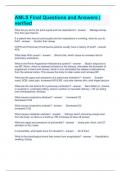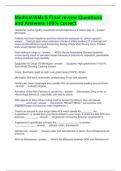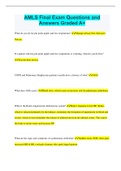Amls final assessment - Study guides, Class notes & Summaries
Looking for the best study guides, study notes and summaries about Amls final assessment? On this page you'll find 33 study documents about Amls final assessment.
Page 4 out of 33 results
Sort by

-
AMLS Final Questions and Answers |verified
- Exam (elaborations) • 10 pages • 2023
-
Available in package deal
-
- $18.49
- + learn more
AMLS Final Questions and Answers |verified What do you do for pin point pupils and low respirations? Manage airway first, then give Narcan. If a patient who has pin point pupils and low respirations is vomiting, what do you do first? Suction their airway COPD and Pulmonary Emphysema patients usually have a history of what? AFib What does AFib cause? Blood clots, which cause an increase risk for pulmonary embolisms What is the Renin-Angiotensin-Aldosterone system?...

-
Medical/AMLS Final review Questions and Answers 100% correct
- Exam (elaborations) • 5 pages • 2023
-
- $15.49
- + learn more
Medical/AMLS Final review Questions and Answers 100% correct Headache, nuchal rigidity, fever/chills and photophobia is a classic sign of: Meningitis Patients who have headache and fever should be assessed for: (which sign(s)?) Kernig's (pain when extension of knee at sitting position; 'K' in Kernigs and knee) and Brudzinsky's signs (involuntary flexing of legs when flexing neck). Positive tests would indicate meningitis. Fluid shifting in lungs is: ARDS (Acute Respiratory ...

-
AMLS Final Exam Questions and Answers Graded A+
- Exam (elaborations) • 23 pages • 2023
-
Available in package deal
-
- $9.99
- + learn more
AMLS Final Exam Questions and Answers Graded A+ What do you do for pin point pupils and low respirations? Manage airway first, then give Narcan. If a patient who has pin point pupils and low respirations is vomiting, what do you do first? Suction their airway COPD and Pulmonary Emphysema patients usually have a history of what? AFib What does AFib cause? Blood clots, which cause an increase risk for pulmonary embolisms What is the Renin-Angiotensin-Aldosterone system? Body's response to low...

That summary you just bought made someone very happy. Also get paid weekly? Sell your study resources on Stuvia! Discover all about earning on Stuvia


